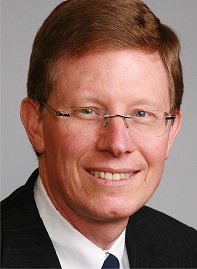Why Eye Care Professionals should use EHRs and get Connected to each other and to their Patients
 By Blair Butterfield, President, North America at VitalHealth Software
By Blair Butterfield, President, North America at VitalHealth Software
With the arrival of healthcare reform, and the unprecedented investment by the federal government in incentivizing physicians of all stripes to adopt and meaningfully use electronic health records, it should come as no surprise that eye care professionals (i.e. optometrists and ophthalmologists) are also in the throes of digitizing their practices.
While a number of ECP’s have gone electronic some time ago, for many the use of paper continues. However, certain technological advances are now adding to the financial incentives to make it likely that a large number of ECP’s will make the switch this year and in the coming two years. The benefits will be profound, not only to the providers but to their patients as well.
When you stop and think about it, this has been a long time coming. And it is understandable that ECPs have lagged somewhat in adoption. Theirs is one of the more complex healthcare practices, in that they are not only frontline providers for common eye care health issues, but also must run an ordering and supply chain function that delivers prescription lenses in a package that includes frames to a quality standard that meets the most demanding customer – after all, when it comes to our eyes and our vision, everyone is very particular about what is acceptable. So having an IT solution that combines clinical documentation, scheduling, ordering, and claims submission and tracking in a single offering is a complex need that few vendors are able to deliver. In fact, very few vendors have even attempted to enter the space given the complexity, and the fact that mainstream EHRs are not easily adapted and customized to the specialized ECP workflows. And since most eye care practices are small, one or two physician operations, they lack the time and resources to piece together a complete offering from several different vendors or make the investment to work with a particular vendor on a custom solution.
Now that the federal government is offering incentives to ECPs for adoption of EHR technology, and with the recent emergence of cloud-based platforms that can integrate all these disparate functions into a single monthly subscription product, the time is ripe for ECPs to make the switch from paper. The result will be more up-to-date and efficient practice, that has better ability to capture a rich clinical encounter record from each patient, and have that record drive the associated claim (by semi-automated coding and claims preparation) and also result in an electronic order without re-keying any of the information captured in the visit. All of this will bring ECPs into the digital age. Combine this with advances in imaging and refraction technology, which also deliver electronic results, and we can see how today’s ECP can finally be confident that going paperless is in fact not only possible but inevitable. For their patients, the opportunity to also gain access to an online summary of their care, and be able to see their order and know when their new glasses will arrive, is exciting – and on par with what they can already get when tracking packages or viewing their bank records online.
This is a time of great transformation in healthare, and while ECPs have often played second fiddle to the larger, acute care organizations that have larger staff, more capital to spend on IT, and solutions that directly address their clinical needs, today we see the very real possibility that ECPs can leapfrog over these organizations and adopt solutions that are in fact more integrated, more advanced, and more user friendly. Disruptive innovations are likely to result, and the consequences for all of health IT will be interesting to watch.
About the Author: Blair Butterfield is the President, North America for VitalHealth Software. He leads the North American business and member of the global executive leadership team for VitalHealth Software, which was founded as a collaboration between Mayo Clinic and the Noaber Foundation. Blair has over 20 years of global experience in new market and business development, general management, government initiatives, strategic marketing, product strategy, and consulting. Follow VitalHealth on Twitter @VitalHealthSoft.
